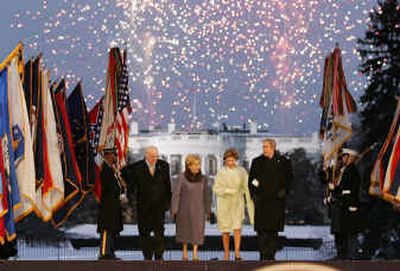A first for First Family

WASHINGTON – The Bush family shuns the word “dynasty,” but President Bush’s inauguration today secures the clan’s position as the most powerful family in American political history.
No other lineage includes two presidents, a U.S. senator and the governors of two very large states. Not the Adamses, not the Kennedys, not the Roosevelts, not the Rockefellers.
On a more personal level, his second-term inauguration symbolizes George W. Bush’s biggest victory in a lifelong struggle with his family’s expectations. After following his father to prep school, to Yale University, to the Texas oil fields and into politics, he now claims the one prize that escaped his father: another four years in the White House.
It’s almost hard to believe now that some of Bush’s relatives used to worry that he’d waste his good name boozing with his oil field buddies in West Texas instead of fulfilling his destiny as the grandson of former Sen. Prescott Bush of Connecticut and the eldest son of former President George H.W. Bush. At his low point, most political observers thought that his brother, Florida Gov. Jeb Bush, would be the second Bush in the White House.
“He’s conquered the ghosts,” said Doug Wead, a former adviser to Bush’s father. “He’s conquered his drinking. He’s conquered Jeb. He’s beaten his dad.”
Bush returns to the White House with an agenda of historic ambition, topped by his intention to make Iraq the first domino in the spread of democracy throughout the Middle East. He also bids to overhaul Social Security, the biggest and most popular federal program in history, and to reshape the income-tax code. Success would guarantee his place as a pivotal figure in history. Failure would tarnish his reputation and diminish the family legacy.
Now that he’s won a second term, Bush seems more at ease than ever with his family ties. After keeping his relatives at arm’s length, at least in public, during his first term, Bush gave his father and brother high-profile roles in the tsunami-relief effort.
His father teamed up with former President Clinton to lead a fund-raising drive; Jeb Bush traveled to the tsunami-devastated region with Secretary of State Colin Powell. The presidential assignments fed speculation that the family already is looking beyond George W.’s final term.
Jeb Bush has ruled out a presidential campaign in 2008, but even some associates who take him at his word note that he easily could run sometime after that.
“He’s been successful, and he’s knowledgeable, and he’d be a wonderful public servant at the national level,” former President Bush said of Jeb Bush in an interview with Time magazine for his eldest son’s selection as “Person of the Year.”
President Bush also has been slightly more open about the father-son link. At his first news conference after the Nov. 2 election, he said he sent his 80-year-old father to bed at 3:30 a.m. on election night when it was clear that vote counting would continue well into the dawning day.
“I never got to see him face-to-face to watch his, I guess, pride in his tired eyes as his son got a second term,” the president said wistfully.
The new spirit of openness contrasts with his earlier efforts to escape his father’s shadow.
“I will let my dad defend himself,” he said early in the 2000 campaign, after other Republican candidates had criticized the elder Bush. “His record stands for itself. I’m the person running for president.”
The patriarch and his politically ambitious children agreed on the arms-length strategy at least as early as 1998, when George W. Bush was running for re-election as governor of Texas and Jeb Bush was running for governor of Florida.
“These comparisons are inevitable and they will inevitably be hurtful to all of us, but not hurtful enough to divide, not hurtful enough to mean anything,” the elder Bush advised his sons in a letter that was later published in “All the Best,” a collection of his writings.
Family members also have agreed that any advice that flows from the nation’s 41st president to the 43rd will remain confidential. Although Bush and his father talk often, their conversations are considered classified information at the White House. The extent of the father’s influence is likely to be a hot topic for historians, especially now that one of the elder Bush’s closest aides, former national security adviser Brent Scowcroft, has been critical of U.S. policy in Iraq.
But associates of the two don’t even raise the topic of their communications.
“I’m not sure we’ll ever know,” said George Edwards, a presidential scholar at Texas A&M University who recently hosted the elder Bush at one of his classes. “I go out of my way not to ask about things like that. I know it would just make him uncomfortable.”
Edwards said the elder Bush was “on cloud nine” after his son’s re-election. The former president told Time that he views his son’s return to office as an affirmation of Bush family values.
“I don’t think the elites in this country, quote, got it, unquote, about George when he talked about family and faith and marriage and these things,” he said. “I do think that the president’s on to something, maybe in the same way that we are, too, his parents are – certain values.”